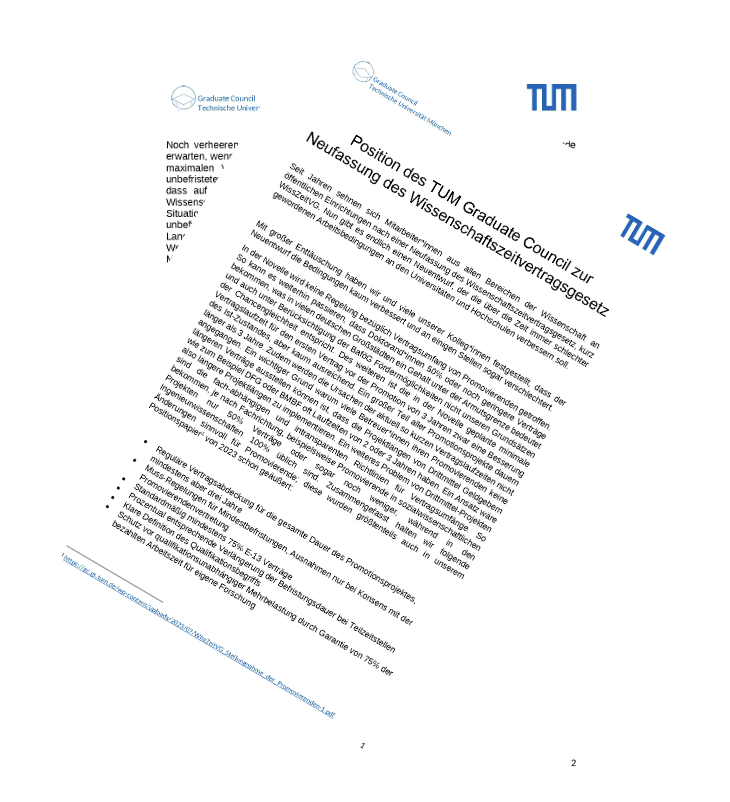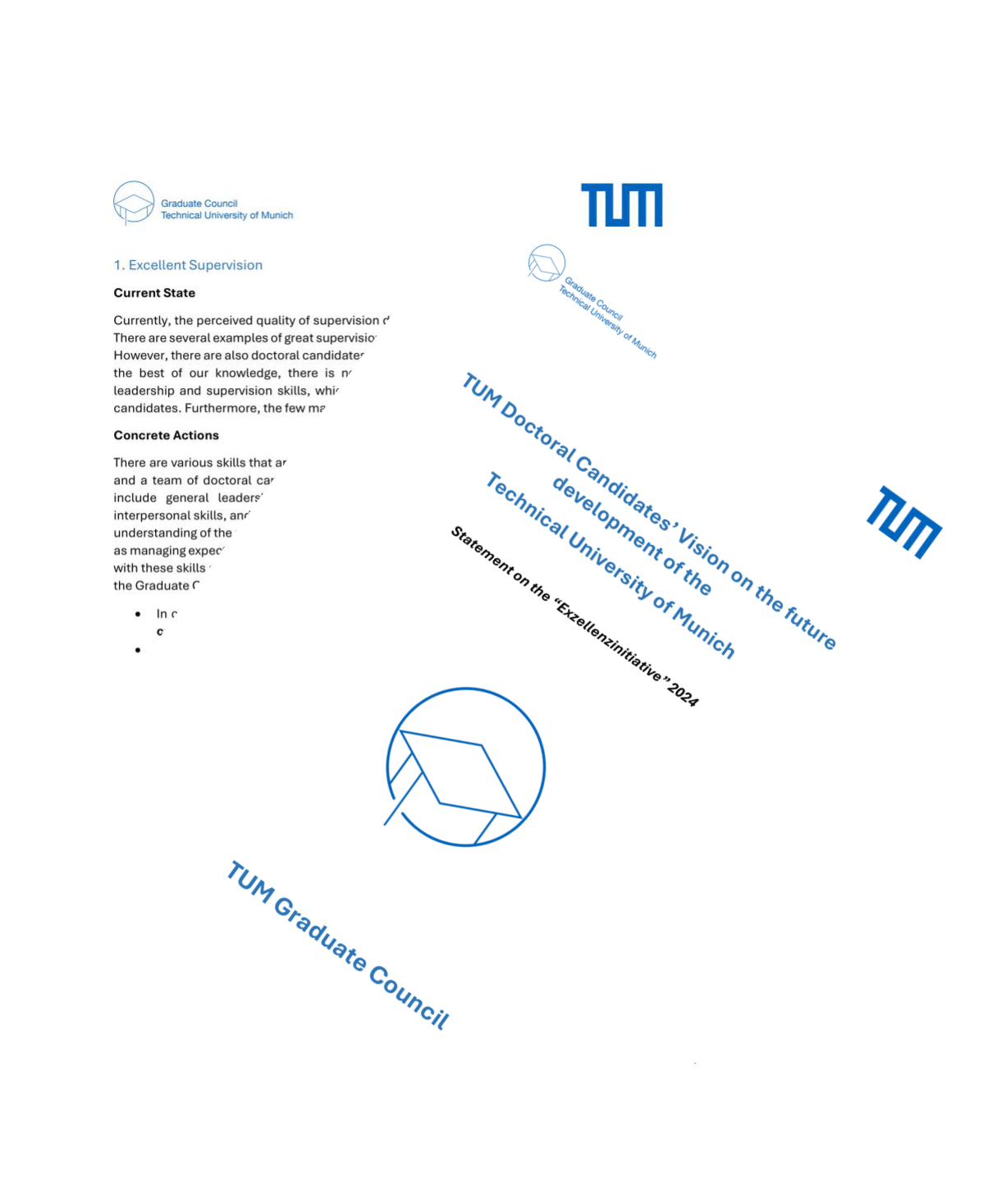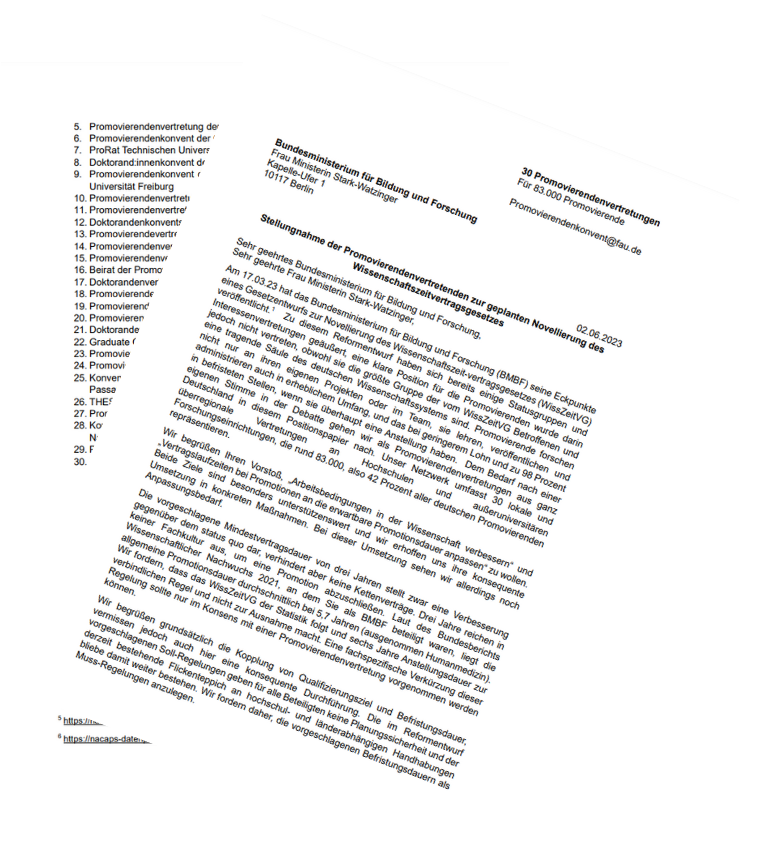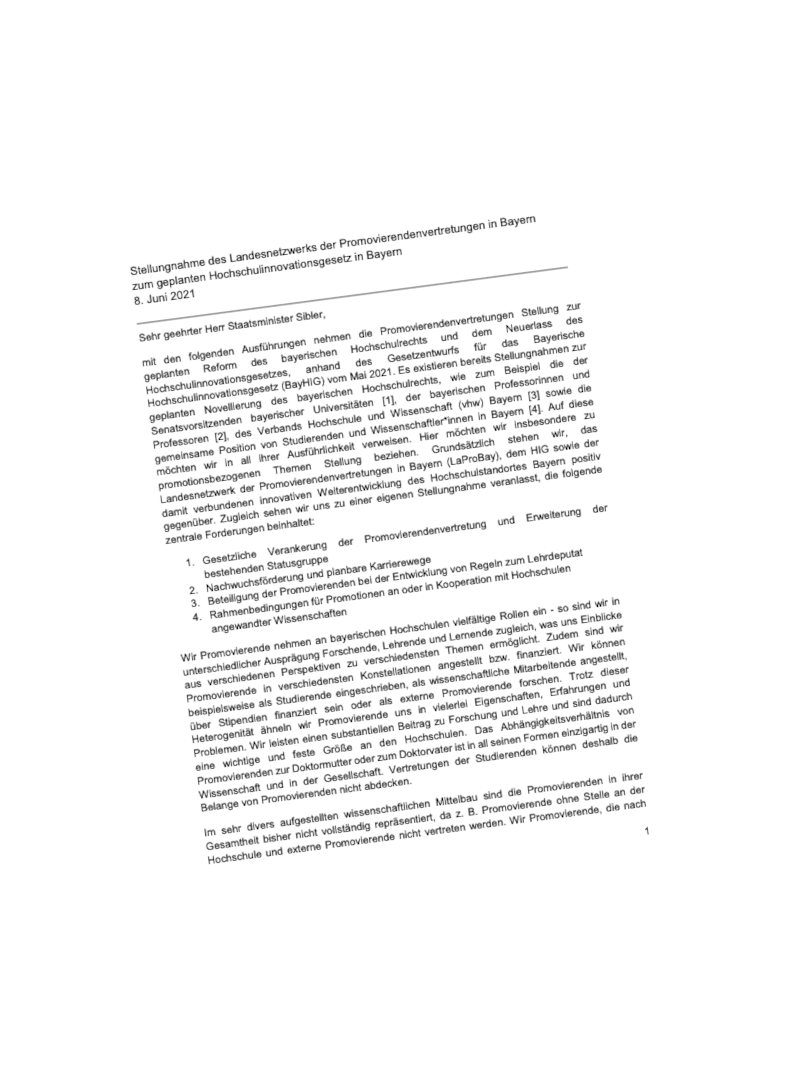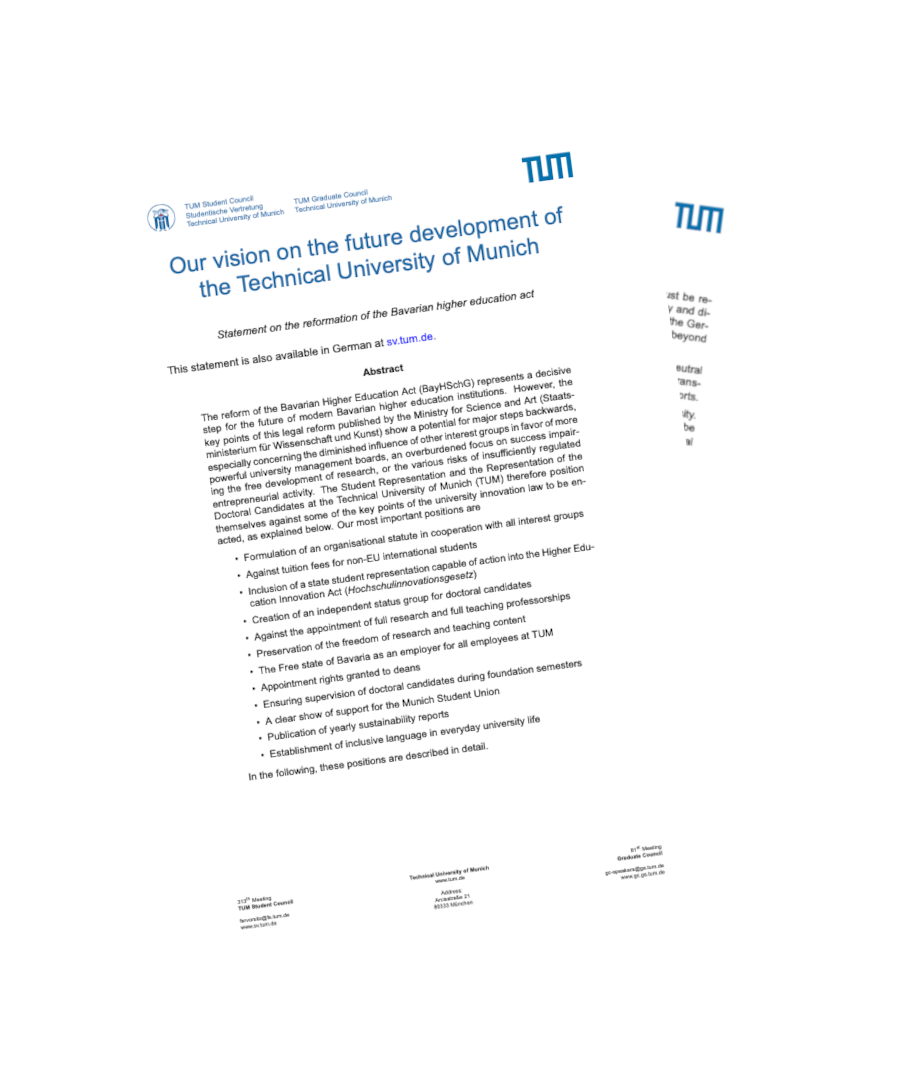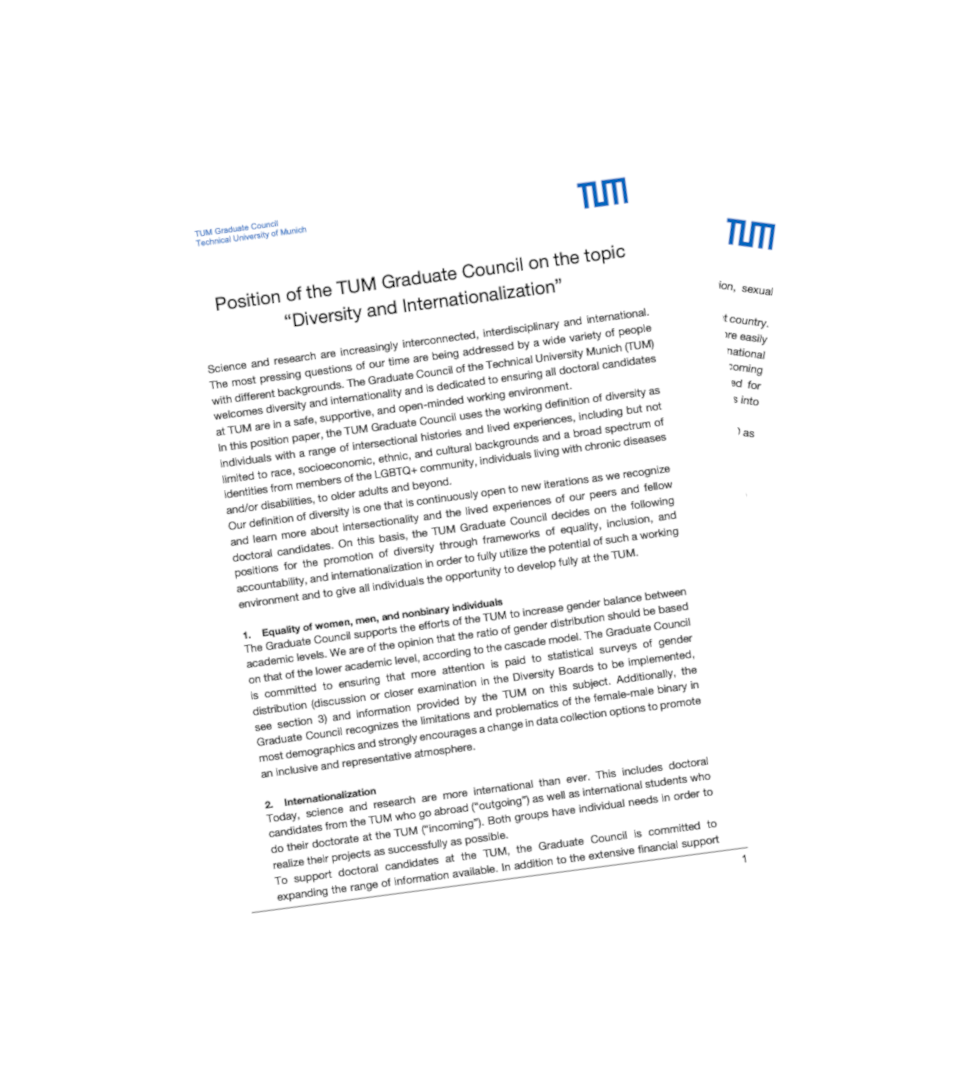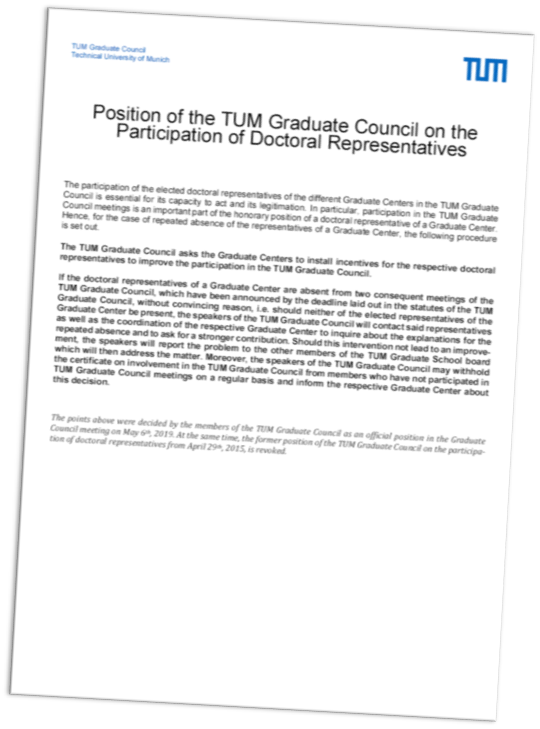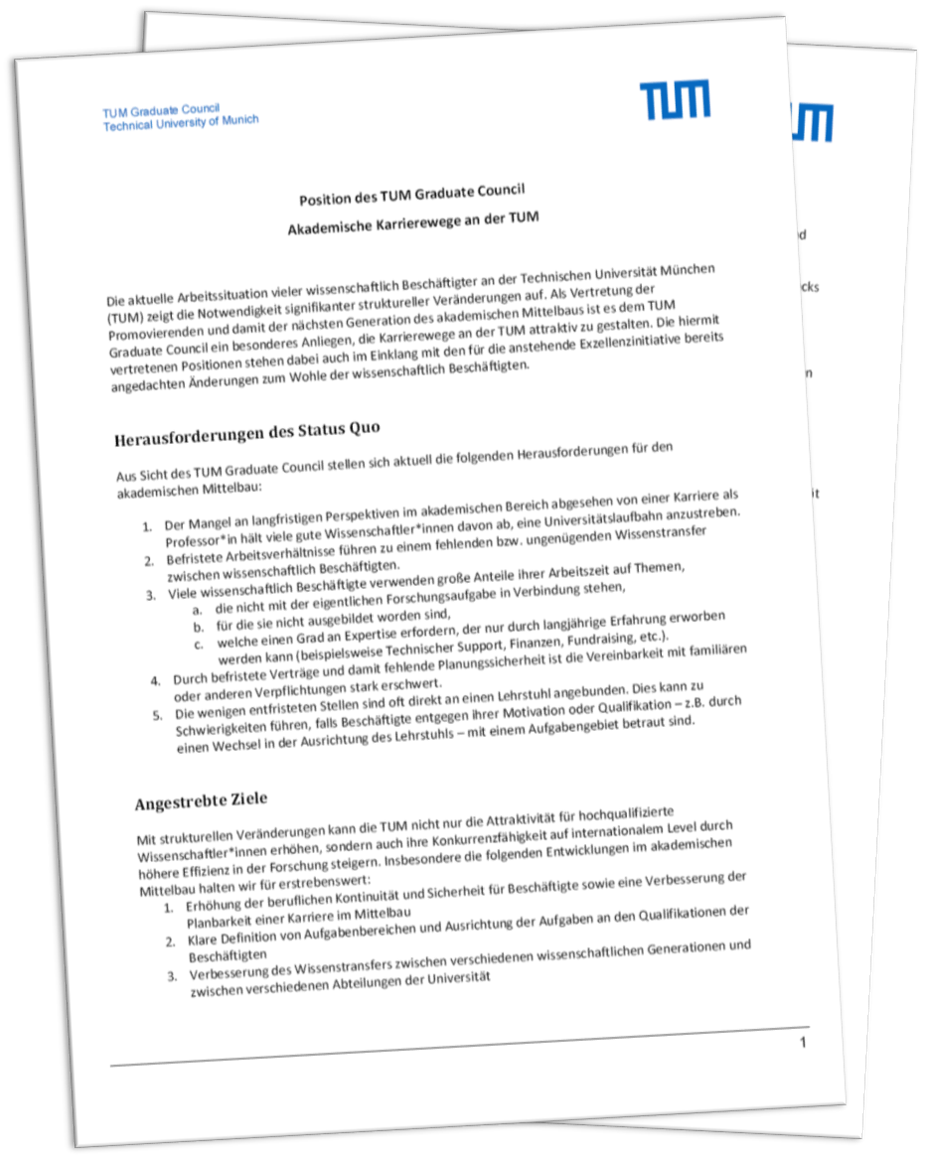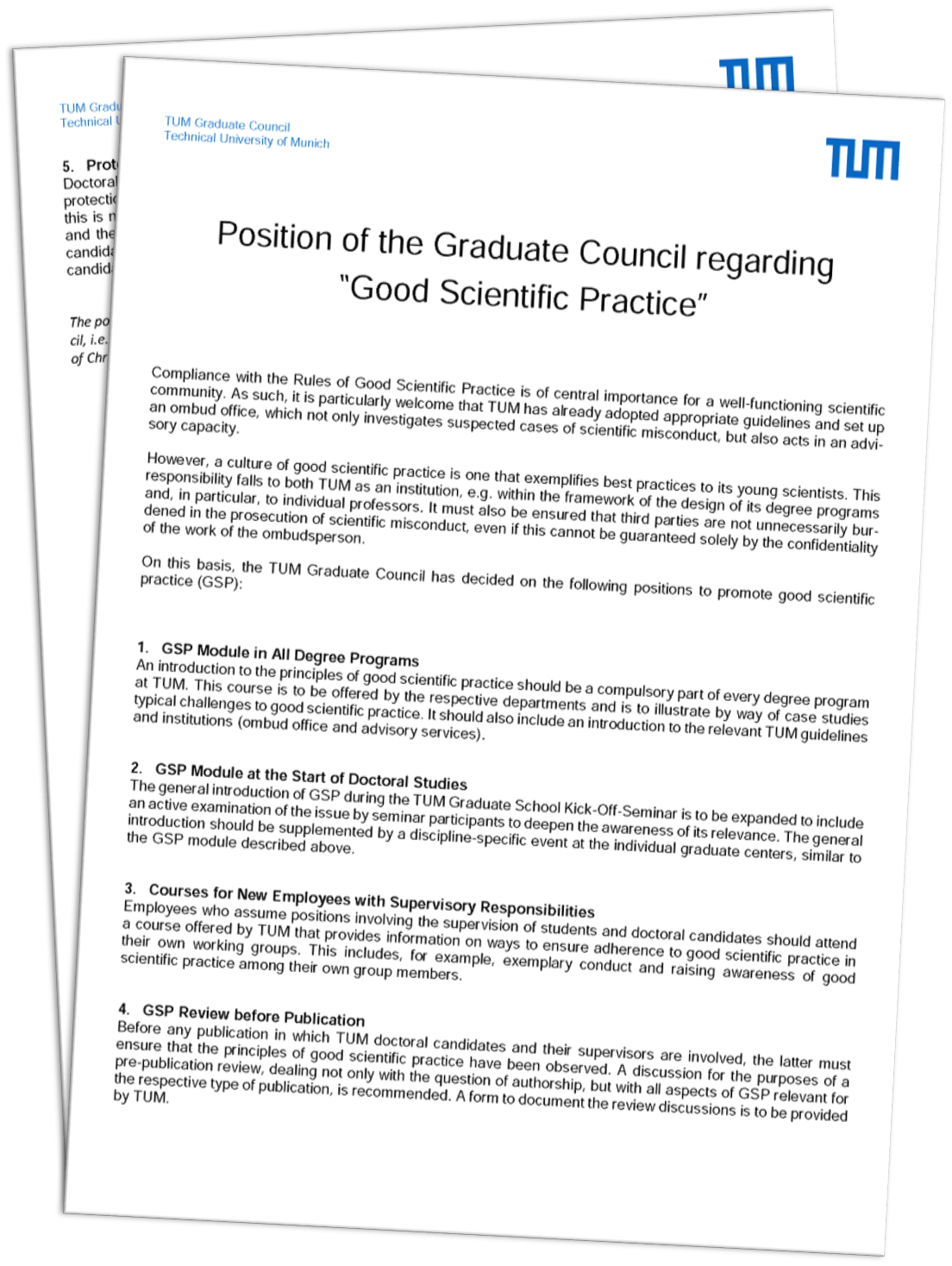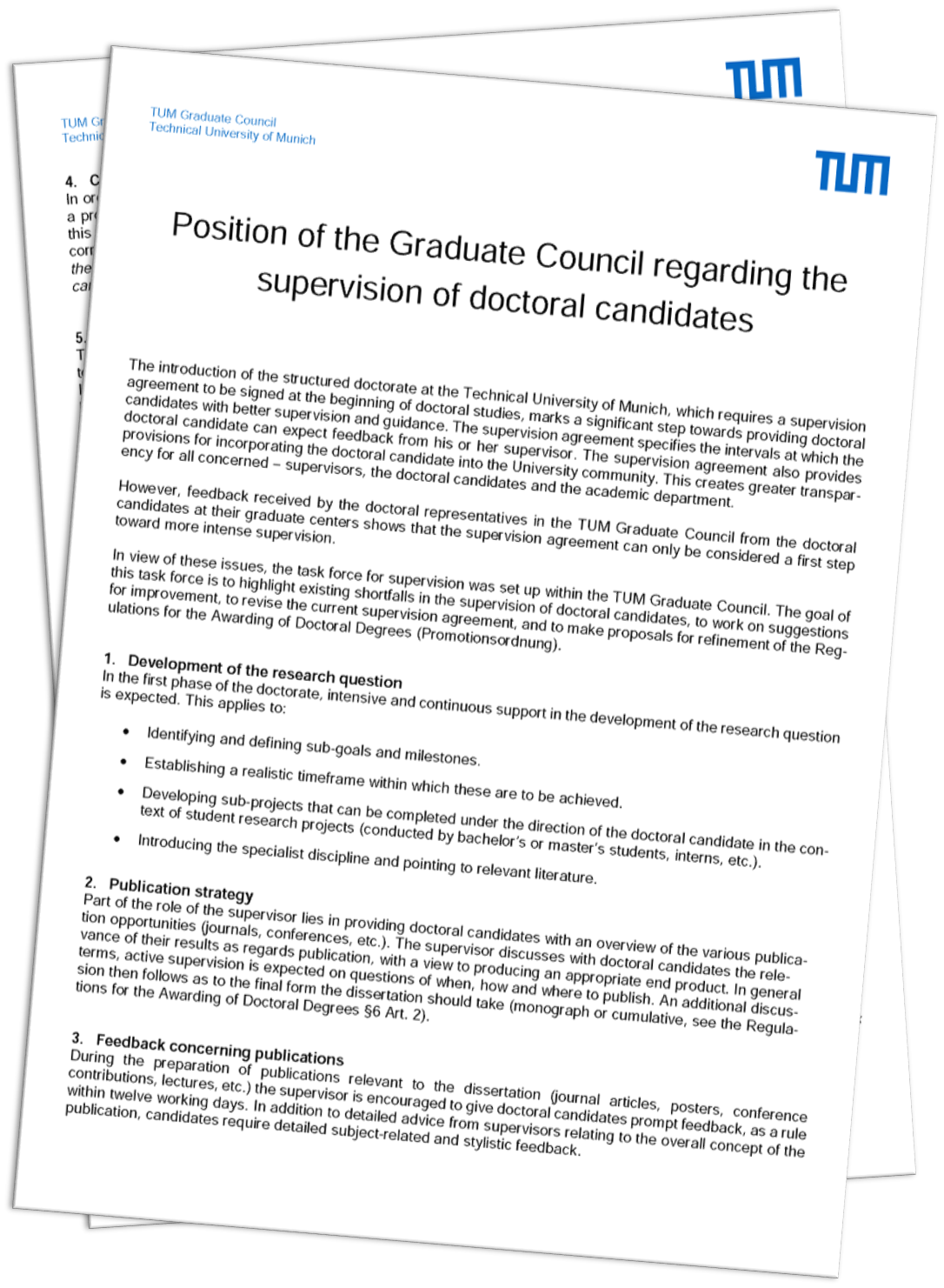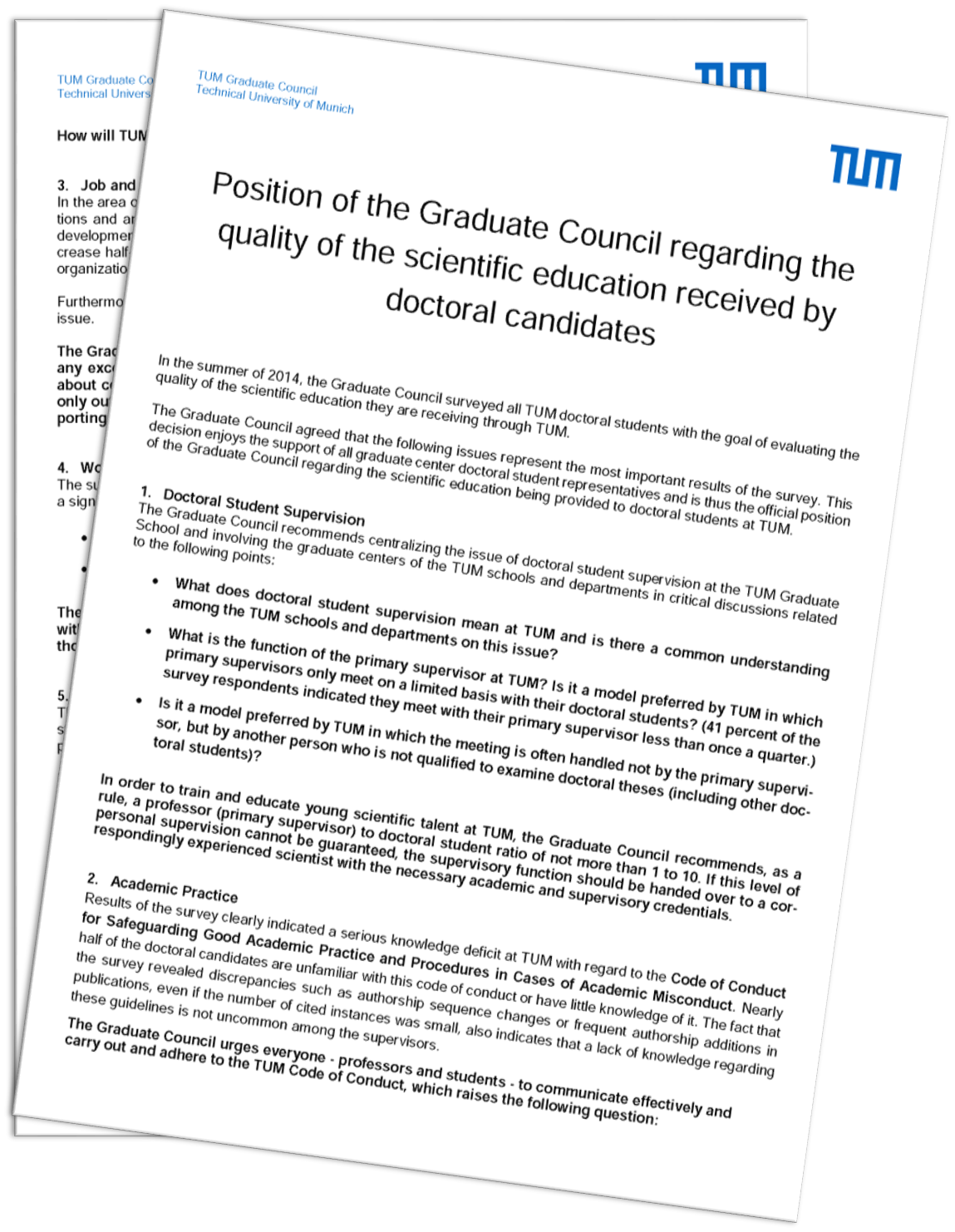Position Paper of the TUM Graduate Council about the planned amendment of the WissZeitVG
The TUM Graduate Council (GC) has worked on a position paper on the new Wissenschaftszeitvertragsgesetz (WissZeitVG). The Bundestag and the Federal Ministry for Education and Research plan to amend the WissZeitVG. An amendment of this law is long overdue but the current plans of Minister Stark-Watzinger contain major issues for doctoral candidates. The GC is very disappointed to see that the new draft hardly improves conditions and, in some places, even worsens them. The amendment does not contain any regulation regarding the scope of contracts, which means that it can still happen that doctoral candidates receive 50% or even lower contracts, which means a salary below the poverty line in many major German cities. Furthermore, the minimum contract term of three years planned in the amendment for the first contract is an improvement on the current situation, but hardly sufficient. The circumstances are even worse on the PostDoc level. Here, the maximum contract lengths are now limited to only four years. This will result in scientists moving abroad or even leaving the scientific community completely.
Download Position:
Position Paper of the TUM Graduate Council about the Excellence Initiative
The German federal and state governments utilises the Excellence Strategy to promote outstanding universities. As TUM has continuously been honored with the title “University of Excellence” since 2006, it can be reasonably concluded that TUM is one of the best universities in Europe. With the Agenda 2030, TUM has set itself a comprehensive strategy for the sustainable and future-proof development of the university. From lifelong learning and human-centered engineering to new and personalised forms of teaching and digitization, the list of achievements is long, but so are the challenges. The success of the “TUM Excellence Strategy” depends on the people who have to turn these ideas into reality. One large group to whom this responsibility falls are the doctoral students. Teaching and Scientific research is not possible without the enormous contribution of doctoral students. It is therefore necessary to incorporate the needs of doctoral students into the Excellence Initiative. In the following section, the TUM Graduate Council will propose the three most important improvements. Excellent supervision, good working conditions and inter- and trans-disciplinary colloquiums are indispensable prerequisites for a successful doctorate.
Download Position:
Statement of the doctoral representatives on the planned amendment of the Wissenschaftszeitvertragsgesetz
To keep Germany attractive and competitive as a science location in the long term and to prevent the “brain drain” that is not unjustly feared, the scientific career must also become an attractive choice for young people. Doctoral students are intrinsically highly motivated, but the systemically created unnecessary hurdles screen out those who cannot or do not want to afford insecurity and dependency, which often also affects those best suited for research and teaching.
We, therefore, welcome the announced revision of the draft reform and call for it to meet your demands for fundamental improvements in working conditions.
Our demands for a sustainable WissZeitVG are summarized:
- Six years of regular employment instead of systematic chain contracts
- Mandatory regulations for minimum time limits, exceptions only if there is consensus with the doctoral representative
- Corresponding percentage extension of the fixed-term contract for part-time positions
- Clear definition of the concept of qualification
- Protection against additional workload independent of qualifications by guaranteeing 75% of the paid working time for your own research
Download Position:
[Deutsch]
Position Paper of the Landesnetzwerks der Promovierendenvertretungen in Bayern (LaProBay) about the Bavarian Higher Education Act
In 2020, doctoral representatives in Bavaria started exchanging ideas on matters concerning doctoral candidates and on how to build representative structures across the state. Since then, a network of universities with regular meetings was established: the Landesnetzwerk der Promovierendenvertretungen in Bayern, with members from the universities in Bayreuth, Erlangen-Nuremberg, Munich (TU), Regensburg and Würzburg.
In this position paper presented to the Ministry of Science and Art, LaProBay focuses on the doctoral-related topics of the Bavarian Higher Education Act. LaProBay calls for:
1. legal anchoring of the doctoral representations and their inclusion into the existing status groups.
2. promotion of young researchers and plannable career paths
3. participation of doctoral candidates in the development of rules on teaching load
4. framework conditions for doctorates at or in cooperation with universities of applied sciences (HAWs)
Position Paper of the Student Council and the Graduate Council on the amendment of the Bavarian Higher Education Act
Since the Bavarian Ministry of Science and Arts published the key points of the planned reform of the Bavarian Higher Education Act in October 2020, a broad and constructive discussion about the future direction of the Bavarian higher education landscape has flared up. In this discussion, the perception of the next generation of scientists, who are currently in training, is unfortunately only taken into account to a limited extent. At the Technical University of Munich, for example, this generation forms the largest group with approximately 45,000 students and approximately 7,000 doctoral candidates, who share similar ideas for an innovative Bavarian university landscape.
For this reason, the Student Council and the Graduate Council have dealt intensively with this issue and jointly drafted a position paper outlining their vision for the future development of the Technical University of Munich. The contents were developed by working groups, discussed in regular meetings of the representative bodies, and finally passed in parliamentary processes as a position paper by the Student Council and the Graduate Council.
The nine-page paper is not to be understood as a pure critique of the published key points on the reform of the Bavarian Law for Higher Education. Rather, it is intended to express the requirements of the next generation of scientists regarding this reform and to serve as an invitation to a constructive dialogue.
Diversity and Internationalization
Our society is formed by individuals with a vast range of backgrounds, intersectional histories and lived experiences. The TUM Graduate Council welcomes internationality and diversity at the Technical University of Munich, and is dedicated to ensure that all doctoral candidates are in a safe, supportive, inclusive and open-minded environment.
Therefore, the TUM Graduate Council supports the efforts to increase gender balance and equality; to implement diversity boards at school and university level; and to provide a family-friendly environment through childcare facilities. In addition to this, we demand to expand assistance on burocratic matters to the incoming doctoral candidates.
Finally, the TUM Graduate Council opposes to any form of discrimination and proposes the creation and expansion of workshops related to intercultural education and anti-racism, as well as to intersectionality and diversity.
Position of the TUM Graduate Council on the Participation of Doctoral Representatives
As is true for any representative body, the Graduate Council can only be what its members make of it. For that reason and more specificallyfor the Graduate Council’s capacity to act as well as for its legitimation, active participation by the elected doctoral representatives of the different Graduate Centers is crucial.
Hence, the Graduate Council has already introduced measures to incentivize active participation at its meetings and in its working groups, such as an official certificate over the voluntary involvement of its members as well as events like the annual summer festival and the Graduate Council retreat in Raitenhaslach.
With this position, the Graduate Council complements these measures by setting out a procedure on how to act concerning Graduate Centers with lacking participation at the Graduate Council meetings,as well as conditions to which the above benefits, in particularthe certificate, are tied. Finally, we also ask the Graduate Centers to encourage their respective doctoral representatives to be an active part of the Graduate Council and to install complementary incentives to this effect themselves.
Academic Career Paths at TUM
Today’s doctoral candidates are the potential academic mid-level employees of tomorrow. However, due to a significant wage gap compared to jobs in the private sector and the prevalence of short-term contracts without further perspectives in academia, mid-level positions are currently less attractive for promising candidates.
As a core concept of the next Excellence Initiative at TUM, the program CareerDesign@TUM will offer employees at the academic mid-level opportunities to continue their career in designated expert tracks. The program outlines academic careers at TUM aside from a professorship and supports employees who want to focus on their strengths, be it in science management, teaching or research.
In our position on academic career paths, the TUM Graduate Council welcomes this initiative and suggests further measures to improve the situation for current as well as future employees at the academic mid-level. Our propositions include a compulsory leadership training for executive members of TUM as well as the expansion of childcare and other complementary services. Furthermore, we demand the implementation of a maximum number of doctoral candidates per supervisor as well as of scientific staff to administrative and technical employees to guarantee a high supervision quality and a fair distribution of tasks.
Hospitality of doctoral representatives in the department councils
Many important decisions in university politics are made on department level, particularly during the regular meetings of the department councils. Even though doctoral candidates usually represent the largest fraction of employees at the department level, they are rarely and if, only indirectly via the elected representatives of the research associates (mostly post-docs or long-term academic staff), involved in the decision-making process. In addition, external doctoral candidates, who are not employed by the Technical University of Munich (e.g. because they hold a scholarship), are not at all represented in the department councils, even though they are directly affected by their decisions.
For this reason, the TUM Graduate Council requests all department councils to grant a permanent right of hospitality in the meetings of the department council for the elected doctoral representatives of the associated graduate center(s).
Good Scientific Practice
A culture of Good Scientific Practice (GSP) is central for the scientific community’s well-functioning, and young scientists should embrace it from the beginning. Therefore, the Graduate Council calls for learning modules for both students and doctoral candidates to raise awareness on GSP at early stages. Similarly, aspiring professors and employees with supervisory responsibilities should take special GSP courses to ensure that they will follow a consistently high standard in their working groups.
Furthermore, GSP should be present when preparing a publication and when choosing a publisher. In this sense, the Graduate Council calls for a pre-publication review discussion and commitment to avoid predatory journals.
Finally, the Graduate Council demands to increase protection for those affected by the scientific misconduct of others. After all, doctoral candidates should neither feel morally impelled nor fear for their own doctoral projects when informing the ombudsperson about a supervisor’s misconduct.
Supervision of doctoral candidates
The introduction of the structured doctorate at the Technical University of Munich, which requires a supervision agreement to be signed at the beginning of the doctoral studies, marks a significant step towards providing doctoral candidates with better supervision and guidance.
However, feedback received by the doctoral representatives in the TUM Graduate Council from the doctoral candidates at their graduate centers shows that the supervision agreement can only be considered a first step towards more intense supervision.
In view of these issues, we highlight existing shortfalls in the supervision of doctoral candidates, to work on suggestions for improvement, to revise the current supervision agreement, and to make proposals for refinement of the Regulations for the Awarding of Doctoral Degrees (“Promotionsordnung”).
Quality of the scientific education received by doctoral candidates
In the summer of 2014, the Graduate Council surveyed all TUM doctoral students with the goal of evaluating the quality of the scientific education they are receiving through TUM.
The Graduate Council agreed that the following issues represent the most important results of the survey. This decision enjoys the support of all graduate center doctoral representatives and is thus the official position of the Graduate Council regarding the scientific education being provided to doctoral students at TUM.
- Doctoral Student Supervision
- Academic Practice
- Job and Employment Contracts
- Workplace Safety
- Mentors

